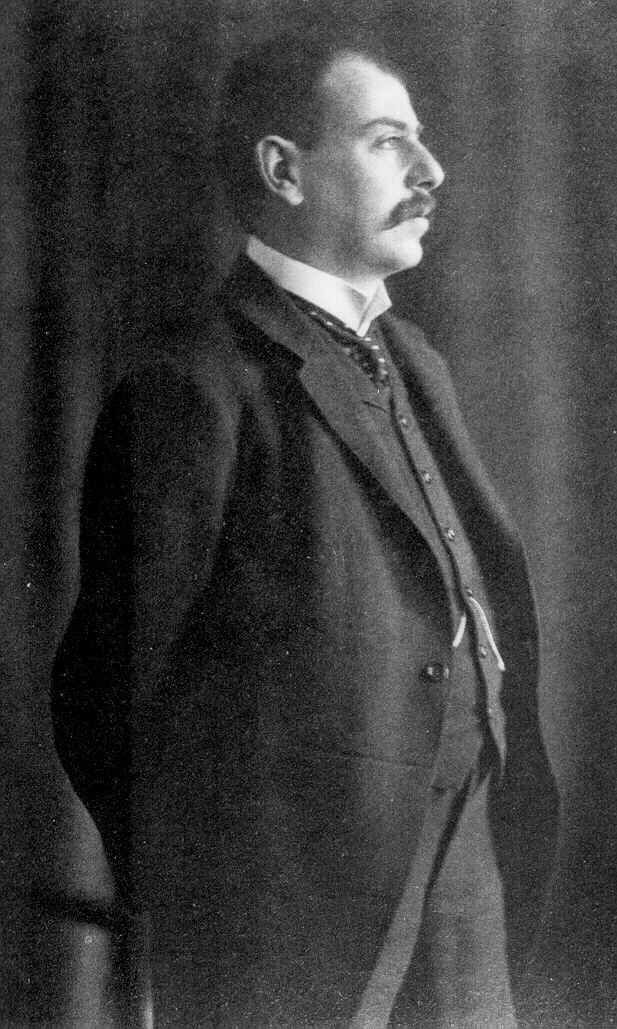
Edmund Landau was born in
Berlin to a rich assimilated Jewish family. His father, a gynecologist, was a German patriot, who at the same time promoted Jewish traditions and the Zionist cause. Landau got his education in the French Lycee, and at 16 he entered the University in Berlin. In 1905 he married Marrianne Ehrlich, daughter of the Nobel prize winner Paul Ehrlich. Very early in school, Landau showed exceptional talent in mathematics, coupled with a remarkable sense of duty and precision. Perfection characterized his lectures and papers. To these days, his book "Foundation of Analysis" is a standard reference on the axiomatic foundations of the number system. At the age of 22 Landau received his doctorate, and two years later the "Habilitation", granting him the right to teach at the University. His topic was analytic number theory, and he soon became a leading expert in the field, a very prolific writer, and a successful teacher too. It was only natural that in 1908, when Göttingen University looked for a successor to Hermann Minkowski, they offered him the chair. With Hilbert and Klein, and later on, as successor to Klein, Caratheodory, Hecke (both left after short periods) and Courant, Göttingen became the unrivaled center for mathematics in Germany. It later attracted the applied mathematician Runge, the statistician Felix Berstein, and the algebraist Emmy Noether. Hermann Weyl succeeded Hilbert in 1930. Landau stayed in Göttingen until 1933, when he was dismissed by the Nazis. In 1934 he moved to Berlin, where he died naturally in 1938. Landau's dismissal from Göttingen is part of the tragic story of the destruction of this remarkable center of mathematics by the Nazis. In the early 30's the national socialists in Göttingen included in their ranks some very promising young mathematicians, like Witt, Teichmüller and others. They focused on the Mathematical Institute in their racist attacks. Many of its faculty were Jewish (beside Landau, there were Bernstein, Courant and Noether, and so was Weyl's wife). In addition, most of the faculty there had a reputation for being "liberals", perhaps even Marxists. Thus, when the government issued in April 1933 the decree according to which Jewish civil servants had to be dismissed, unless they had been civil servants before World War I (as in Landau's case), or had done frontline fighting during the war, the ministry put on temporary leave Bernstein, Courant and Noether. The atmosphere in Göttingen was becoming intolerably anti-Semitic. In March 1933 there already were boycotts of Jewish shops, and the local SA violently harassed their owners. At the "recommendation" of the ministry, Landau too was asked not to teach his calculus class, and instead it was taught by his assistant Werner Weber, himself a fervent national-socialist. Landau insisted on preparing the course, and during each class actually sat in his office, as though was waiting for the wheels to turn back. By the beginning of the next term, in November 1938, Weyl had already left to Princeton. Courant was still on leave, and Noether had been dismissed. Landau attempted to resume his calculus class himself. The students staged a boycott with SA guards standing at the doors, and forced Landau to retreat to his office. On November 2, Teichmüller presented Landau with a letter formally explaining why they did not find him "fit for teaching". The well-known Berlin mathematician Bieberbach, a strong supporter of the Nazis, praised the students for their action. A decade prior to that, Bieberbach still collaborated with Landau in a long correspondence. The racist ideology won, and Landau had no way but to retire. His last year he spend in Berlin, occasionally making mathematical trips to Holland and England. The department in
Göttingen never recovered its lost glory.
Reinhard Siegmund-Schultze :
Landau and Schur : Documents of a friendship until death in an age of
inhumanity. EMS Newsletter,
June 2012, pp.31--36.
More information :
Obituary
Reproduced from J. London Math. Soc. 13 (1938) 302-310
Related articles :
Schappacher, Norbert :
Edmund Landau's Göttingen --- From the life and death of a great
mathematical center.
Mathematical Intelligencer 13 (1991), 12--18.
(Talk at the Dedication of the Landau Center for
Research in Mathematical Analysis, Jerusalem, Feb. 28th, 1989).